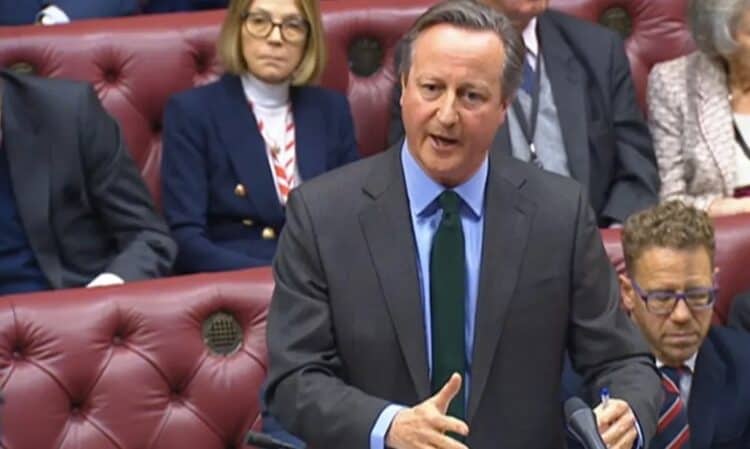David Cameron, the former foreign secretary, reportedly ignored advice from Foreign Office officials in both Israel and London that indicated there was clear evidence of breaches of international humanitarian law (IHL) in Gaza, potentially implicating the UK in these violations. This information comes from a former adviser at the Foreign, Commonwealth and Development Office (FCDO).
The source, who helped draft the advice, spoke out after the Labour government revoked 30 out of approximately 350 arms export licences. The decision, outlined in a government memorandum released on Monday, was based on a clear risk that the exported arms might be used in serious breaches of international humanitarian law.
The adviser noted that the content of the memorandum is “similar to what was being sent to the government from at least February onwards in various drafts by Foreign Office advisers, much of it linked to the deteriorating humanitarian situation in Gaza. But what has been eventually published is in much less strident language.”
The source further highlighted concerns about the delay in revoking the licences, stating: “The tragedy has to be considered: how many lives might have been saved if the arms export licences had been stopped then and not in September, and what the potential ripple effect might have been on how other countries would have reacted in ceasing trade.”
The adviser also emphasised that the advice provided to the Foreign Office made it clear that the breaches of international humanitarian law by Israel, as the occupying power, were so evident that failing to withdraw the licences posed a risk of UK complicity.
Legal and Political Backdrop
A member of the previous government stated that its legal advice was somewhat similar to that released by Labour regarding the treatment of detainees and humanitarian aid. However, the official insisted that the advice was constantly evolving and did not explicitly call for a suspension of arms sales to avoid breaching international humanitarian law.
The controversy over how it took a British government 10 months to recognise the risk of serious breaches of IHL comes amid fierce criticism from Israeli Prime Minister Benjamin Netanyahu. Netanyahu denounced Labour’s decision to suspend the licences, calling it a betrayal of Israel. He said on social media platform X: “This shameful decision will not change Israel’s determination to defeat Hamas, a genocidal terrorist organisation that savagely murdered 1,200 people on October 7, including 14 British citizens.”
Netanyahu added: “Just as Britain’s heroic stand against the Nazis is seen today as having been vital in defending our common civilization, so too will history judge Israel’s stand against Hamas and Iran’s axis of terror … With or without British arms, Israel will win this war and secure our common future.”
Israeli officials have also expressed frustration with the timing of the UK’s announcement, which came just 24 hours after it was reported that Hamas had killed six Israeli hostages. British ministers, however, stated that the decision was made public on the first day MPs returned from their summer recess.
UK-Israel Relations and Broader Reactions
While relations between the UK and Israel are reported to be increasingly strained, Israeli sources currently do not foresee Netanyahu taking any immediate reprisals against the UK.
A notable exemption in the UK’s arms ban is that nearly all British components for the F-35 fighter jet programme are excluded, a loophole that has drawn criticism from pro-Palestinian groups. By keeping these components out of the embargo, the UK aims to minimise diplomatic fallout with the United States.
Elsewhere in the Middle East, Jordan’s foreign minister, Ayman Safadi, welcomed the British decision but called for a broader boycott. UK Prime Minister Keir Starmer also held discussions with Mohammed bin Zayed al-Nahyan, the president of the United Arab Emirates. The UAE, a key player in Middle Eastern diplomacy, became an unofficial check on Israel’s potential annexation of the West Bank after signing the 2020 Abraham Accords.
Calls for Internal Reform and Legal Action
The FCDO source argued that there are broader lessons to be learned from the handling of the issue. “Israel highlights vital lessons globally for arms companies and countries which grant export licences as part of elaborate trade deals,” the source said. “The reality is that none of these licences are granted in isolation of other business and political interests, and are enmeshed with other forms of trade technology exchanges and security equity.”
The source also pointed to internal disarray within the Foreign Office, noting disputes between humanitarian, legal, and political teams, as well as conflicts with sections of the Ministry of Defence.
This critique coincides with a long-running legal case against the Foreign Office’s decision-making on arms sales. On Tuesday, a high court judge postponed a hearing to allow claimants time to reconsider their case in light of the recent suspension of 30 arms licences. The full-day hearing is now scheduled for 18 November.
Campaigners from Al-Haq and the Global Legal Action Network argue that the UK acted unlawfully by excluding most British components of the US-led F-35 jet fighter aircraft from the sales ban. The case is also expected to examine the UK’s failure to assess the legality of airstrikes, sniper attacks, and controlled demolitions in Gaza, as well as the exclusion of evidence of humanitarian law breaches in the West Bank.
You may also like: Government ignored warnings about fire risks in high-rise buildings, Grenfell report finds





